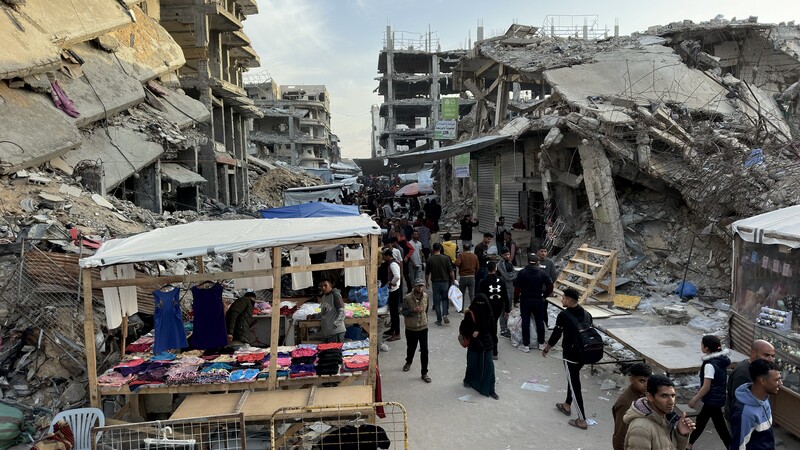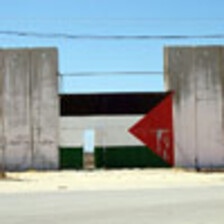The Electronic Intifada 5 May 2025

Israel’s blockade on Gaza includes cash. Here, people walk past a market stall in Khan Younis on 29 March 2025.
ActiveStillsMaha Mahdi, 51, had worked hard for many years to save up money for her children’s education.
The mother of four sons aged between 12 and 19 combined a daytime job as an assistant at a medical analysis laboratory with private lessons to save up money for her children’s education.
She had prudently turned her savings into gold. She always dreamed her children would join the medical profession. But studying medicine is expensive, and gold seemed a sensible method for saving in the meantime.
But in Gaza today, cash has all but disappeared. Aside from the brief ceasefire interlude that started in January and Israel ended on 19 March, when some cash aid was delivered by international organizations, no cash had entered Gaza for 15 months prior and none since.
In the first three months alone after October 2023, according to the World Bank, Israel destroyed or damaged 93 percent of all bank branches.
With no banks and only the cash that was already there – so overused by now that it is starting to disintegrate – Palestinians in Gaza have had to improvise.
Digital transactions have eased some of the pressure, while bartering has become common.
People have been burning through what savings they may have had, including Maha, who parted with her gold in order to get much-needed cash for survival.
“For every piece of gold I sold, I felt like I was selling a piece of my dreams and ambitions.”
Salaries too are impossible to convert to cash, and anyone still able to receive an income has had to pay forbidding commissions as traders – themselves desperate for cash – have lifted rates as high as 35 percent.
Every endeavor
The lack of cash affects everyone and every endeavor.
Sereen Abu al-Kas, 21, was married during the genocide. But not only did her husband-to-be have to pay dowry via bank transfer, when she went to stores to prepare for the wedding she could not find anyone who accepted card payment.
She could not afford or find any of the many things she had dreamt about for her wedding and her joy, she said, was “incomplete.”
Saif Al-Din Ouda, head of policy at the Palestinian Monetary Authority, PMA, told the GAza-based human rights group, Al Mezan, that Israel had refused to transfer the Gaza allocation of clearance funds Israel collects on behalf of the Palestinian Authority since the beginning of the aggression.
Israel has also banned the PMA, in effect the PA’s central bank, from sending any cash to the Gaza Strip since October 2023.
The upshot is that those with savings in the bank cannot cash them and it is both difficult and expensive to spend it.
“It’s very difficult to pay electronically,” Amal Abu Saada, who used to work in the private sector, told Al Mezan. “The war has left only market stalls, where it is rare to find anyone willing to deal with electronic payment methods, especially with the power cuts.”
As a result, Amal said, even though she has money in the bank, “I am now unable to meet the most basic of our needs.”
Opportunity for some
And while some exchange shops are willing to accept electronic transfers for cash, commissions have grown prohibitive, charging as much as 35 percent, or a potential $350 commission to cash out $1,000, and sometimes even more.
WIth the tattered state of the cash available in Gaza, moreover, getting cash is no guarantee that the money can be used. Many traders will simply refuse to take old or damaged bills, and they can even refuse to take coinage, including 10-shekel coins.
On one occasion in a market in Deir al-Balah I heard one person trying to convince a trader who refused to accept a 10-shekel coin in exchange for goods purchased, that the coin was in perfect condition.
“Why are you refusing to take it?” The response: “The traders we buy from refuse to accept the coin.”
In another corner of the market by a bakery, a woman presented a 100-shekel bill to a vendor who refused to accept it. In the end, the woman was forced to return the goods she had come for, while asking out loud, to no one in particular, “should I throw it away?”
Of course, every crisis brings opportunity, and Palestinians in Gaza have become experts at survival by other means.
Elsewhere in the crowded market, Muhammad al-Masri was busy repairing and restoring worn-out paper currency. Using simple equipment, some alcohol solution for cleaning and a special adhesive, he carefully restores worn-out bills to make them fit for circulation again.
“I most often receive and repair the 20-shekel note, because it has now replaced the 10-shekel coin that is no longer accepted by merchants,” he told The Electronic Intifada
Working for a loss
Ultimately, of course, it is the ordinary person who suffers.
Saeed Bassam, 27, used to work for a mobile phone company. He now uses his car as a taxi to try to secure some cash to buy milk and diapers for his baby daughter Rose.
Due to the rise in fuel prices, he does not make a profit. On the contrary, he told The Electronic Intifada, he is often losing money. But it is, he said, the only way he can secure cash.
“I lose less than I would paying commissions,” he said. “It also keeps me busy.”
The problem with high commissions is as acute as ever. During the ceasefire, rates decreased, and traders started accepting bank transfers.
Now, however, rates have risen back up and merchants are again refusing bank transfers.
The practice of repairing worn-out currency has become more widespread, however. In every market, there is someone repairing currency notes.
“Rola Hamdouna is a writer and translator from Gaza.*


